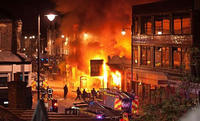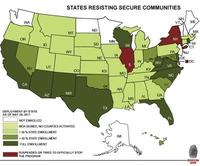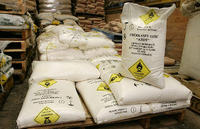-
Statistics helps calculate uncertainty of aging U.S. nukes

How do you test a not-so-young nuclear stockpile for the effects of age when you cannot detonate any for the sake of finding out? The U.S. government has not conducted live nuclear tests since the early 1990s, but a BYU scientist offers solid answers — based on statistical analysis and without setting off any weapons
-
-
Four days of rioting strains U.K. legal system

The ongoing unrest in the United Kingdom has begun to strain the country’s criminal justice and law enforcement system; with police arresting hundreds of people over the last few days, local judges have had trouble keeping up with the case load and facilities have quickly become overcrowded
-
-
San Francisco to install real-time surveillance on buses
Thanks to a $6 million DHS grant San Francisco’s MUNI buses will soon be equipped with a network of sophisticated high-tech video cameras that will allow the transit agency to view footage in real-time
-
-
Emergency alerts for cell phones
Residents living near Austin, Texas can now receive important emergency notifications on their cell phones for free; with more and more individuals switching to cell phones and abandoning their land lines, emergency responders and government officials have been forced to adapt emergency warning systems to connect to cell phones instead
-
-
Record number of immigration bills introduced in 2011
This year state lawmakers have introduced a record number of immigration bills and resolutions according to a new report by the National Conference of State Legislatures; so far in the first half of the year, state legislators have seen 1,592 immigration bills, 16 percent more than the same time period last year
-
-
China's big surveillance push
In China’s latest push to keep tabs on its citizens, police in Beijing have ordered supermarkets and shopping malls throughout the city to install high-definition security cameras; the recent order comes as part of a broader expansion in monitoring technology which includes the addition of millions of surveillance cameras over the past five years and large increases in domestic security spending
-
-
DHS set to expand Secure Communities over local objections

To help put an end to state and local authorities’ objections over the controversial Secure Communities program, the director of Immigration and Customs Enforcement announced on Friday that the agency would end its memorandum of agreements with state governors “to avoid further confusion”; the move is designed to ease DHS’s efforts to expand the immigration program across the nation, despite the increasing criticism that the program has received
-
-
Identifying Canadians from their date of birth, postal code
Researchers find that 97 percent of Canadians can be uniquely identified from their date of birth and postal code; this means that if these to items of information, plus gender, exist in any database, even if it has no names or other identifying information, it would be possible to determine the identity of those individuals birth
-
-
Mumbai bombings tied to homegrown group
Indian government officials have focused on domestic terror, indicating that last month’s triple-bombing in Mumbai was the work of a homegrown group, the Indian Mujahideen; the same explosive formulation was used in these attacks as was used in other attacks where responsibility was claimed by The Indian Mujahideen
-
-
DHS slow to crack down on ammonium nitrate sales

U.S. lawmakers are becoming frustrated with DHS for its slow implementation of regulations on ammonium nitrate fertilizer, a key ingredient in dangerous homemade explosives like the one used in the deadly 1995 Oklahoma City bombing; Congress initially passed legislation tightening control on the sale of the fertilizer in 2008, but DHS has yet to implement such regulations and three years later is only now publishing a set of “proposed” rule
-
-
Report warns Amtrak vulnerable

A new report by the DHS Inspector General warns that Amtrak is vulnerable to terrorist attacks, despite the $1 billion that has already been spent to bolster security; the inspector general found that DHS officials did not ensure that the money was being spent efficiently securing Amtrak’s most vulnerable stations resulting in security gaps
-
-
Illinois cracks down on "storm chasers"
In response to the series of severe storms and floods that struck Illinois, Governor Pat Quinn signed legislation to help protect homeowners as they rebuild; House Bill 3034 is aimed at protecting homeowners from “storm chasers,” contractors who take advantage of unsuspecting homeowners
-
-
Face recognition software may reveal one’s social security number
Researchers demonstrate ability to predict social security numbers from people’s faces; “When we share tagged photos of ourselves online, it becomes possible for others to link our face to our names in situations where we would normally expect anonymity,” one of the researchers said
-
-
Oklahoma woman battles against REAL ID
An Oklahoma woman has sparked a federal controversy after she refused to renew her driver’s license; in February Beach was pulled over by law enforcement officials in Norman, Oklahoma and ticketed for driving with an expired license and she is now fighting that ticket as part of a larger campaign against REAL ID
-
-
Tampa police already training for 2012 RNC convention
In preparation for next year’s Republican National Convention in Tampa Bay Florida, nearly every local police department employee is required to attend a three-day training course; the mandatory training is designed to teach officers how to control large crowds
-
More headlines
The long view
Factories First: Winning the Drone War Before It Starts
Wars are won by factories before they are won on the battlefield,Martin C. Feldmann writes, noting that the United States lacks the manufacturing depth for the coming drone age. Rectifying this situation “will take far more than procurement tweaks,” Feldmann writes. “It demands a national-level, wartime-scale industrial mobilization.”
No Nation Is an Island: The Dangers of Modern U.S. Isolationism
The resurgence of isolationist sentiment in American politics is understandable but misguided. While the desire to refocus on domestic renewal is justified, retreating from the world will not bring the security, prosperity, or sovereignty that its proponents promise. On the contrary, it invites instability, diminishes U.S. influence, and erodes the democratic order the U.S. helped forge.
Fragmented by Design: USAID’s Dismantling and the Future of American Foreign Aid
The Trump administration launched an aggressive restructuring of U.S. foreign aid, effectively dismantling the United States Agency for International Development (USAID). The humanitarian and geopolitical fallout of the demise of USAID includes shuttered clinics, destroyed food aid, and China’s growing influence in the global south. This new era of American soft power will determine how, and whether, the U.S. continues to lead in global development.
Water Wars: A Historic Agreement Between Mexico and US Is Ramping Up Border Tension
By Natasha Lindstaedt
As climate change drives rising temperatures and changes in rainfall, Mexico and the US are in the middle of a conflict over water, putting an additional strain on their relationship. Partly due to constant droughts, Mexico has struggled to maintain its water deliveries for much of the last 25 years, deliveries to which it is obligated by a 1944 water-sharing agreement between the two countries.
How Disastrous Was the Trump-Putin Meeting?
In Alaska, Trump got played by Putin. Therefore, Steven Pifer writes, the European leaders and Zelensky have to “diplomatically offer suggestions to walk Trump back from a position that he does not appear to understand would be bad for Ukraine, bad for Europe, and bad for American interests. And they have to do so without setting off an explosion that could disrupt U.S.-Ukrainian and U.S.-European relations—all to the delight of Putin and the Kremlin.”
How Male Grievance Fuels Radicalization and Extremist Violence
By Haily Tran
Social extremism is evolving in reach and form. While traditional racial supremacy ideologies remain, contemporary movements are now often fueled by something more personal and emotionally resonant: male grievance.
